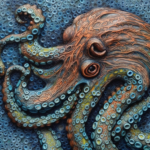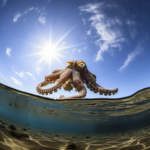Octopuses, often referred to as the geniuses of the sea, are fascinating creatures that possess a level of intelligence that rivals some of the most intelligent animals on land. These cephalopods have captivated scientists and researchers for years with their remarkable problem-solving abilities, complex behaviors, and incredible adaptability. From their ability to camouflage themselves to their impressive problem-solving skills, octopuses have proven time and again that they are truly remarkable creatures. In this article, we will delve into the world of octopus intelligence, exploring their cognitive abilities, learning capabilities, and the intriguing ways in which they navigate their underwater environment. So, let’s dive in and discover just how intelligent these incredible creatures really are.
Key Takeaways
- Octopuses are highly intelligent creatures, capable of problem-solving, learning, and exhibiting complex behaviors.
- Their intelligence is attributed to their large brains, which are proportionally larger than those of most other invertebrates.
- Octopuses have demonstrated the ability to use tools, mimic other animals, and navigate mazes.
- They possess remarkable camouflage abilities, allowing them to blend seamlessly into their surroundings.
- Octopuses are known for their curiosity and inquisitive nature, making them fascinating subjects for scientific study.
The Intelligence of Octopuses: An Overview
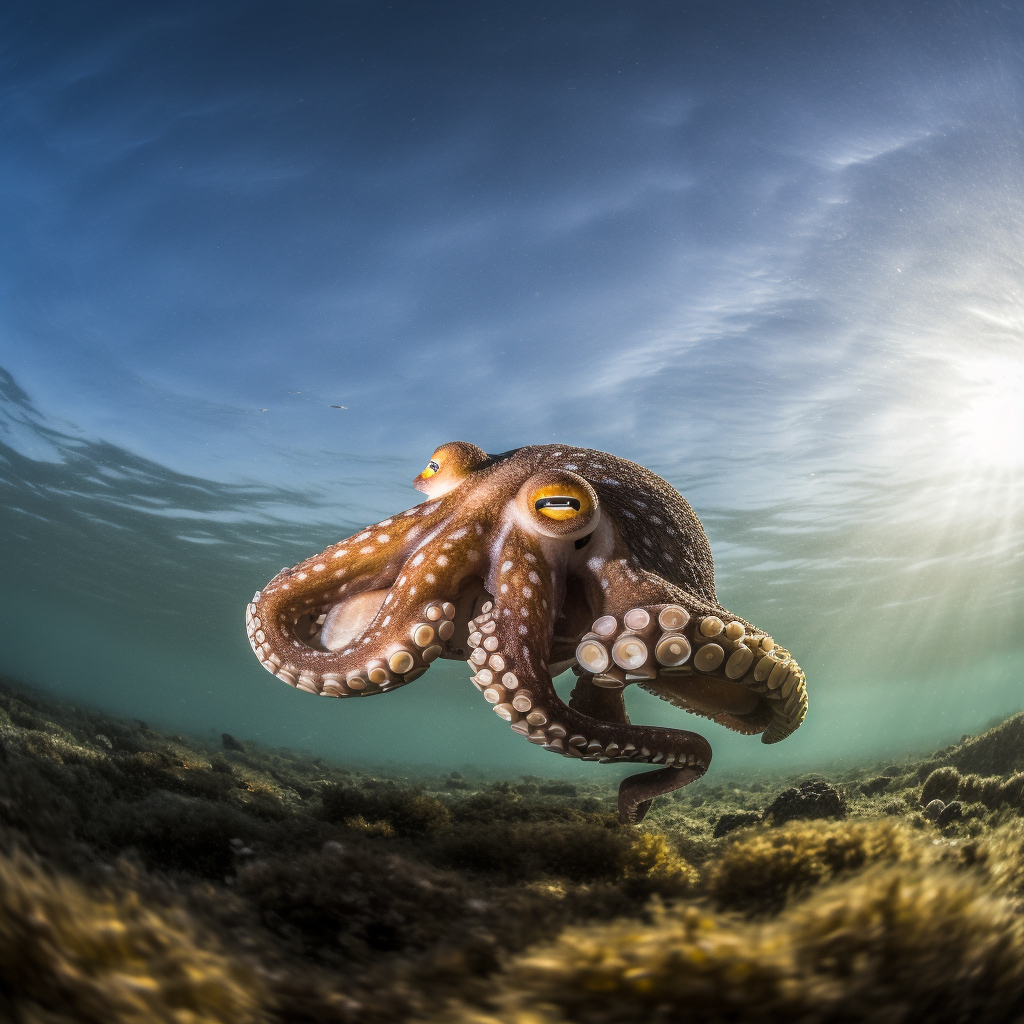
A. Defining Octopus Intelligence
Octopuses are fascinating creatures that have captured the curiosity of scientists and marine enthusiasts alike. These cephalopods possess a level of intelligence that sets them apart from many other marine animals. But what exactly does it mean to be intelligent as an octopus?
Intelligence can be defined as the ability to acquire and apply knowledge, solve problems, and adapt to new situations. When it comes to octopuses, their intelligence is evident in various aspects of their behavior and cognitive abilities.
B. Factors Contributing to Octopus Intelligence
Several factors contribute to the intelligence of octopuses, making them highly adaptable and capable creatures in their marine environment. Let’s explore some of these factors:
-
Octopus Brain Structure: Octopuses have a highly developed nervous system, with a large brain relative to their body size. Their brains are distributed throughout their body, with a significant portion located in their arms. This decentralized neural network allows for complex and independent control of each arm, enabling octopuses to perform intricate tasks simultaneously.
-
Cephalopod Cognition: Octopuses exhibit a remarkable level of cognitive abilities. They are capable of learning and remembering information, recognizing individuals, and even displaying curiosity and problem-solving skills. These cognitive abilities suggest a higher level of awareness and consciousness.
-
Octopus Problem-Solving Skills: Octopuses have been observed using tools to aid in their foraging activities. For example, some species have been seen using coconut shells as portable shelters or using rocks to create barriers for protection. This ability to manipulate objects and use them in a purposeful manner demonstrates their problem-solving skills.
-
Octopus Learning Ability: Octopuses are quick learners. They can adapt their behavior based on previous experiences and observations. Studies have shown that octopuses can learn through trial and error, as well as through observational learning by watching and imitating other octopuses.
-
Octopus Behavior: Octopuses exhibit a wide range of behaviors that indicate their intelligence. They can display curiosity, interact with their environment, and even engage in play behavior. They have been observed exploring their surroundings, investigating objects, and interacting with humans in captivity.
-
Octopus Memory: Octopuses possess an impressive memory. They can remember specific individuals, learn from past experiences, and recall information for extended periods. This memory retention allows them to navigate their environment effectively and adapt their behavior accordingly.
-
Octopus Camouflage Ability: Octopuses are renowned for their remarkable camouflage abilities. They can change the color, pattern, and texture of their skin to blend seamlessly with their surroundings. This adaptive camouflage not only serves as a defense mechanism but also highlights their ability to perceive and respond to their environment.
-
Octopus Communication: While octopuses are primarily solitary creatures, they exhibit various forms of communication. They can use visual displays, such as changing color or posture, to communicate with other octopuses. They also use touch and chemical signals to convey information, such as during mating rituals or territorial disputes.
-
Octopus Sensory Perception: Octopuses have highly developed sensory systems. They possess excellent vision, allowing them to detect subtle changes in their environment. They also have a keen sense of touch, taste, and smell, which aids in their foraging and hunting activities.
-
Octopus Adaptability: Octopuses are incredibly adaptable creatures. They can adjust their behavior and strategies based on changes in their environment. This adaptability allows them to thrive in various habitats and overcome challenges they encounter.
In conclusion, octopuses possess a level of intelligence that is truly remarkable. Their complex brain structure, cognitive abilities, problem-solving skills, learning capacity, and adaptive behavior contribute to their overall intelligence. By studying and understanding the intelligence of octopuses, scientists gain valuable insights into the evolution of intelligence in marine animals and its potential parallels to human intelligence.
Comparing Octopus Intelligence to Human Intelligence
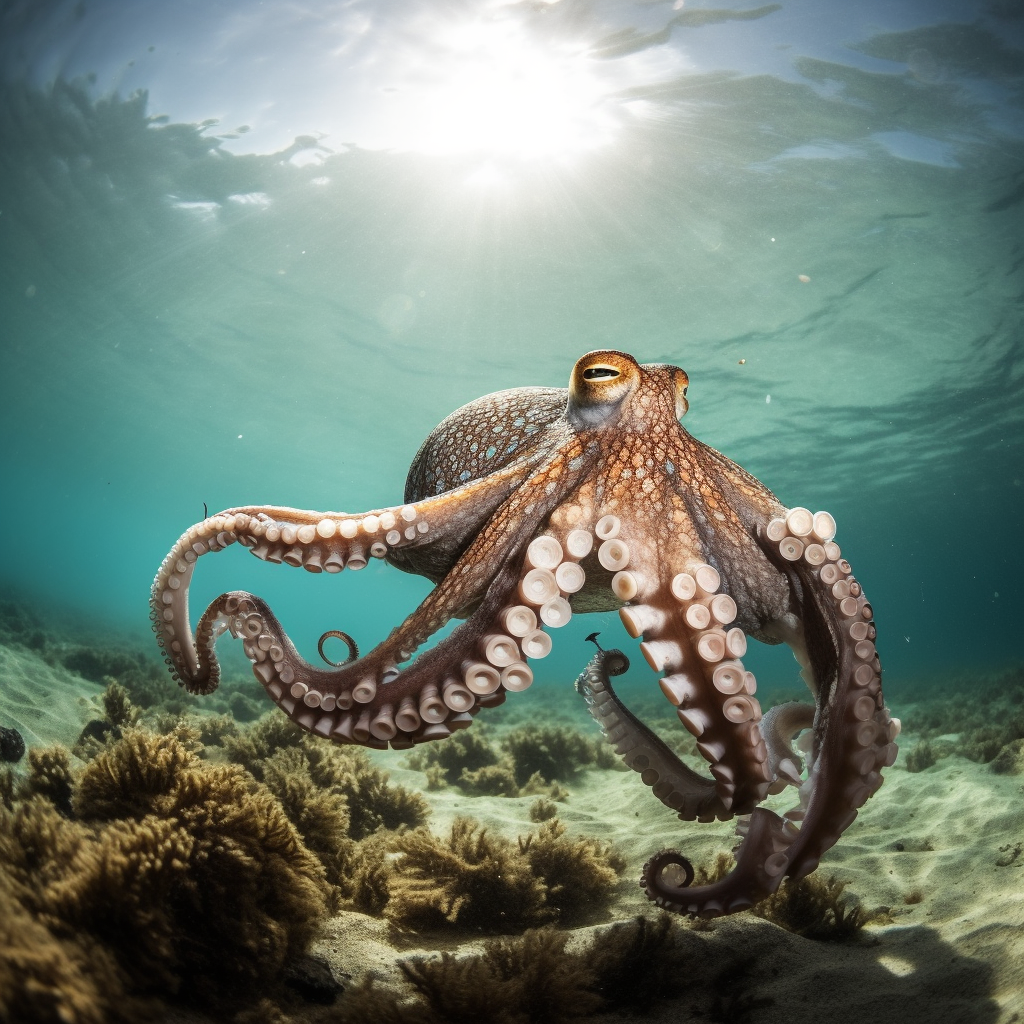
A. Octopus Intelligence in Human Years
When it comes to measuring intelligence, humans have long been considered the gold standard. But how does the intelligence of octopuses compare? While it’s challenging to directly equate octopus intelligence to human intelligence, we can attempt to understand it in terms of human years.
Octopuses have complex behaviors and problem-solving skills that suggest a high level of intelligence. They can manipulate objects, solve puzzles, and even use tools. In fact, some species of octopuses have been observed using coconut shells as portable shelters, demonstrating their ability to think creatively and adapt to their environment.
However, it’s important to note that octopuses and humans have evolved in vastly different environments, with different evolutionary pressures. Octopuses have a decentralized nervous system, with a large portion of their neurons located in their arms. This unique neural network allows them to control each arm independently, giving them incredible dexterity and flexibility.
B. Octopus IQ: A Comparative Analysis
While we often use IQ tests to measure human intelligence, it’s not possible to administer the same tests to octopuses. IQ tests are designed to assess human cognitive abilities, which may not be directly applicable to octopuses. However, researchers have devised alternative methods to evaluate octopus intelligence.
One such method is the “learning and memory” test. Octopuses are presented with a series of puzzles or challenges, and their ability to learn and remember how to solve them is evaluated. Studies have shown that octopuses can learn from observation and retain information for extended periods. This suggests a level of intelligence comparable to some vertebrates.
Another aspect of intelligence is problem-solving skills. Octopuses have been observed using their environment to their advantage, such as opening jars to access food. They can also navigate complex mazes and exhibit impressive problem-solving abilities. These behaviors indicate a high level of cognitive flexibility and adaptability.
C. Octopus Intelligence vs. Human Age: A Unique Perspective
While it’s difficult to directly compare octopus intelligence to human intelligence, a unique perspective is to consider the cognitive abilities of octopuses at different stages of their life cycle. Octopuses have a short lifespan, with most species living only a few years. However, they exhibit remarkable intelligence from a young age.
For example, hatchling octopuses are capable of camouflaging themselves to match their surroundings within hours of hatching. This ability is crucial for their survival, as it helps them evade predators. It’s remarkable to think that these young octopuses possess such advanced cognitive abilities from the moment they enter the world.
As they grow older, octopuses continue to develop their problem-solving skills and learn from their experiences. Their ability to adapt to new situations and solve complex puzzles suggests a level of intelligence that is comparable to some stages of human development.
In conclusion, while it’s challenging to directly compare octopus intelligence to human intelligence, there is ample evidence to suggest that octopuses possess a high level of cognitive abilities. Their problem-solving skills, learning ability, and adaptability are all indicators of their intelligence. By understanding and appreciating the unique intelligence of octopuses, we can gain a deeper appreciation for the diversity of cognitive abilities in the animal kingdom.
Octopus Intelligence in the Animal Kingdom
A. Octopus vs. Dolphins: A Study in Intelligence
When it comes to intelligence in the animal kingdom, dolphins are often hailed as one of the smartest creatures. However, recent studies have shown that octopuses are equally remarkable in their cognitive abilities. While dolphins rely on their highly developed social structures and communication skills, octopuses exhibit a different kind of intelligence that is equally fascinating.
One study conducted by scientists at the University of Cambridge compared the problem-solving abilities of dolphins and octopuses. The researchers presented both species with a series of complex tasks, such as opening jars to retrieve food rewards. Surprisingly, the octopuses outperformed the dolphins in these tests, showcasing their exceptional problem-solving skills.
Unlike dolphins, which rely on their echolocation abilities, octopuses use their keen sense of touch and visual perception to navigate their environment. Their flexible bodies and remarkable dexterity allow them to manipulate objects with precision. This adaptability and resourcefulness contribute to their problem-solving prowess.
B. Octopus vs. Other Animals: A Comparative Analysis
While the intelligence of octopuses is often compared to that of dolphins, it is important to note that these cephalopods possess unique cognitive abilities that set them apart from other animals as well. Octopuses have a decentralized nervous system, with a large portion of their neurons located in their arms. This distributed neural network enables them to process information in a highly efficient manner.
In addition to their problem-solving skills, octopuses also exhibit impressive learning abilities. They can quickly adapt to new environments and learn from their experiences. This adaptability is crucial for their survival in the ever-changing oceanic habitats they inhabit.
Another fascinating aspect of octopus intelligence is their remarkable memory. These creatures have been observed to remember specific individuals and recognize familiar objects. This ability to retain information over extended periods suggests a sophisticated level of cognitive processing.
C. The Unique Intelligence of the Dumbo Octopus
Among the various species of octopuses, the Dumbo octopus stands out for its unique intelligence. Named after the famous Disney character, these deep-sea dwellers possess a set of extraordinary traits that make them truly remarkable.
Dumbo octopuses have been observed to exhibit complex behaviors, such as using tools. In one instance, researchers observed a Dumbo octopus using a discarded coconut shell as a protective shelter. This behavior demonstrates their ability to recognize and utilize objects in their environment to their advantage.
Furthermore, Dumbo octopuses are masters of disguise. They possess an incredible camouflage ability, allowing them to blend seamlessly with their surroundings. This skill not only helps them avoid predators but also aids in their hunting strategies.
In terms of communication, Dumbo octopuses rely on a combination of visual displays and body movements. They can change the color and texture of their skin to convey different messages, such as aggression or submission. This form of communication highlights their sophisticated sensory perception and social interactions.
In conclusion, while dolphins have long been regarded as the epitome of animal intelligence, octopuses are equally deserving of recognition. Their problem-solving skills, learning abilities, memory, tool use, camouflage, and communication strategies all contribute to their unique intelligence. By studying and understanding the intelligence of octopuses, we gain valuable insights into the diverse cognitive abilities present in the animal kingdom.
Squids vs. Octopuses: A Comparative Study of Intelligence
A. Understanding Squid Intelligence
When it comes to the fascinating world of cephalopods, squids are often overshadowed by their more famous relatives, the octopuses. However, squids are no slouches when it comes to intelligence. While they may not possess the same level of problem-solving skills and tool use as octopuses, they still exhibit remarkable cognitive abilities.
One of the key factors that contribute to squid intelligence is their complex neural network. Squids have a highly developed brain, consisting of a central brain and several smaller ganglia distributed throughout their body. This distributed neural network allows them to process information quickly and efficiently, enabling them to make split-second decisions in their environment.
Squids also display a remarkable adaptability to their surroundings. They are known for their ability to change color and texture, allowing them to blend seamlessly with their surroundings. This camouflage ability not only helps them evade predators but also aids in hunting prey. Squids can also communicate with each other using a variety of visual signals, such as changing their skin patterns and flashing their bioluminescent organs.
B. Comparing Squid and Octopus Intelligence
While squids possess their own unique set of cognitive abilities, octopuses are often regarded as the true geniuses of the cephalopod world. Octopuses exhibit a level of intelligence that rivals some vertebrates, including problem-solving skills, tool use, and complex learning abilities.
One of the key differences between squids and octopuses lies in their brain structure. Octopuses have a highly centralized brain, with the majority of their neurons located in their head. This centralized brain allows for more complex information processing and problem-solving capabilities. Octopuses have been observed using tools, such as rocks and coconut shells, to create shelters or retrieve food. This tool use demonstrates their ability to think critically and adapt to their environment.
Octopuses also possess an impressive learning ability. They can quickly learn and remember complex tasks, such as navigating mazes or unscrewing jar lids to access food. This ability to learn and retain information showcases their advanced cognitive abilities.
In conclusion, while squids and octopuses both exhibit intelligence, octopuses stand out as the more intelligent of the two. Their centralized brain structure, problem-solving skills, tool use, and advanced learning abilities set them apart. However, it is important to appreciate the unique cognitive abilities of squids and recognize that intelligence can manifest in different ways across different species.
Unraveling the Secrets of Octopus Intelligence
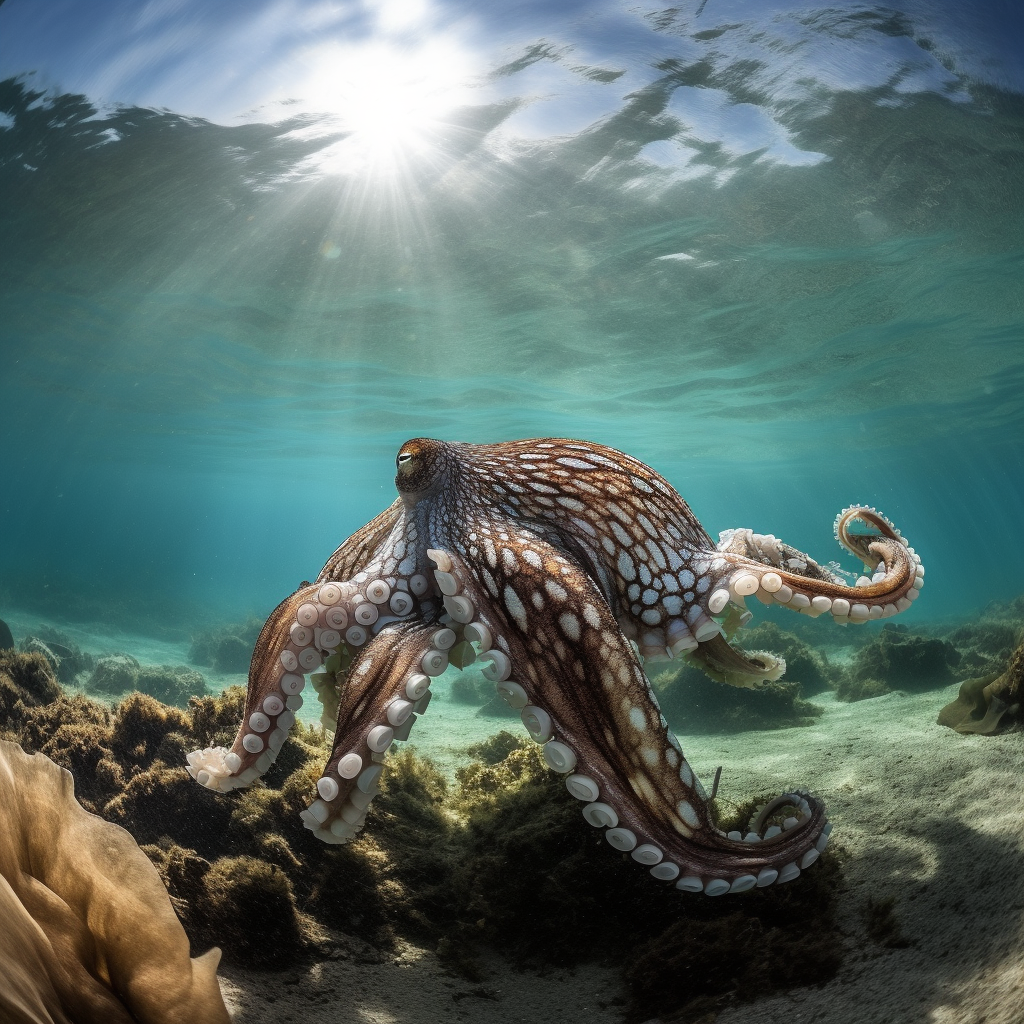
A. What Makes Octopuses Intelligent?
Octopuses are fascinating creatures that have captivated the attention of scientists and researchers for years. Their intelligence level is truly remarkable, and studying their cognitive abilities has provided valuable insights into the world of marine animal intelligence.
Octopus Brain Structure
One of the key factors that contribute to the intelligence of octopuses is their complex brain structure. Unlike most other invertebrates, octopuses have a highly developed nervous system, with a large brain that is centralized in their head. This allows them to process information and make decisions in a way that is comparable to some vertebrates.
Cephalopod Cognition
Cephalopods, the group of animals that octopuses belong to, are known for their advanced cognitive abilities. Octopuses exhibit a wide range of complex behaviors that indicate their cognitive prowess. They are capable of learning, problem-solving, and even using tools to accomplish tasks.
Problem-Solving Skills
Octopuses have demonstrated impressive problem-solving skills in various experiments. They can navigate mazes, open jars to access food, and even unscrew the lids of containers. These abilities require a high level of cognitive flexibility and adaptability.
Learning Ability
Octopuses are quick learners. They can observe and imitate the actions of other octopuses, allowing them to acquire new skills and behaviors. This ability to learn from others is a crucial aspect of their intelligence.
Memory
Octopuses possess an excellent memory, which aids them in navigating their environment and finding food. They can remember the location of objects and even recognize individual humans. This long-term memory is essential for their survival in the ever-changing underwater world.
B. The Cleverness of Octopuses: An Insight
Octopuses are often hailed as masters of disguise and escape artists. Their cleverness and ability to adapt to different situations are truly remarkable.
Escape Artists
Octopuses have a remarkable ability to escape from enclosures. They can squeeze through tiny openings, use their flexible bodies to their advantage, and even camouflage themselves to blend in with their surroundings. This escape artistry is a testament to their intelligence and problem-solving skills.
Camouflage Ability
Octopuses are known for their incredible camouflage ability. They can change the color and texture of their skin to match their environment, effectively disappearing from sight. This skill not only helps them hide from predators but also allows them to sneak up on prey.
Tool Use
Octopuses have been observed using tools in the wild. They have been seen carrying coconut shells to use as protective shelters and using rocks to create barriers. This tool use demonstrates their ability to think critically and adapt their environment to suit their needs.
Communication and Sensory Perception
Octopuses have a sophisticated communication system that involves changing their body color and texture, as well as using body movements and patterns. They can also sense their environment through their highly developed eyesight and touch. These communication and sensory abilities contribute to their overall intelligence.
Adaptability
Octopuses are incredibly adaptable creatures. They can thrive in a wide range of habitats, from shallow coastal waters to the depths of the ocean. Their ability to adapt to different environments and situations is a testament to their intelligence and survival skills.
In conclusion, octopuses are highly intelligent creatures with a remarkable set of cognitive abilities. Their complex brain structure, problem-solving skills, learning ability, memory, and cleverness make them one of the most fascinating creatures in the animal kingdom. Studying octopus intelligence not only provides insights into the capabilities of marine animals but also offers a glimpse into the diversity of intelligence in the natural world.
Conclusion
In conclusion, octopuses are incredibly intelligent creatures that possess a wide range of cognitive abilities. Their problem-solving skills, ability to learn and adapt, and complex behaviors demonstrate a level of intelligence that rivals some of the most intelligent animals on the planet. Octopuses have a remarkable ability to camouflage themselves, use tools, and even exhibit playful behavior. Their large brains and distributed nervous systems allow them to process information and make decisions quickly. While their intelligence may be different from that of humans, it is clear that octopuses are highly intelligent in their own unique way. Further research is needed to fully understand the extent of their intelligence and the mechanisms behind it. Overall, the intelligence of octopuses is a fascinating subject that continues to captivate scientists and researchers alike.
Frequently Asked Questions
How smart are octopus compared to humans?
Octopuses are highly intelligent creatures, but their intelligence is different from human intelligence. They have a complex neural network and excellent problem-solving skills. However, comparing their intelligence to humans is challenging due to the vastly different brain structures and cognitive processes.
How intelligent are octopus compared to other animals?
Octopuses are among the most intelligent of all invertebrates. They exhibit advanced problem-solving skills, adaptability, and learning abilities that are comparable to or even surpass some vertebrates. For instance, they are known to be more intelligent than most fish and reptiles but may not match the cognitive abilities of mammals like dolphins.
How clever are octopus?
Octopuses are incredibly clever. They are known for their problem-solving skills, ability to use tools, and remarkable escape artistry. They can unscrew lids, mimic other animals, and even navigate mazes, demonstrating a level of intelligence that is quite sophisticated for a marine animal.
How intelligent are squids?
Squids, like octopuses, are cephalopods and are known for their intelligence. They have excellent problem-solving skills and adaptability. However, octopuses are generally considered to be more intelligent due to their advanced tool use and complex behaviors.
How smart are dumbo octopus?
The intelligence of the Dumbo octopus is not as well-studied as other octopus species. However, as a member of the cephalopod family, it can be assumed that they possess a certain level of intelligence, including problem-solving skills and adaptability.
How intelligent are octopus compared to humans age?
The intelligence of an octopus does not directly correlate with human age. Octopuses mature and learn rapidly, with some species living only for a year or two. Their intelligence is more about their ability to adapt, learn, and solve problems, rather than a comparison to human developmental stages.
How smart are octopus in human years?
The lifespan of an octopus varies by species, but most live between 1 to 2 years. Despite their short lifespan, octopuses exhibit a high level of intelligence and learning ability. However, equating their intelligence to human years is not straightforward due to the differences in lifespan and cognitive development.
What is the intelligence of an octopus?
Octopuses are highly intelligent. They have a large brain and a complex neural network, which allows them to exhibit advanced problem-solving skills, learning abilities, and adaptability. They can use tools, change their body color and texture for camouflage, and are known for their remarkable escape artistry.
How intelligent octopus works?
The intelligence of an octopus is attributed to its large brain and complex neural network. They have the ability to learn from experience, solve problems, and adapt to their environment. Their intelligence also extends to their ability to use tools, camouflage themselves, and exhibit complex behaviors.
What makes octopus intelligent?
Several factors contribute to the intelligence of an octopus. These include their large brain, complex neural network, excellent problem-solving skills, and ability to learn from experience. Their adaptability, tool use, and sophisticated behaviors like camouflage and mimicry also demonstrate their intelligence.

